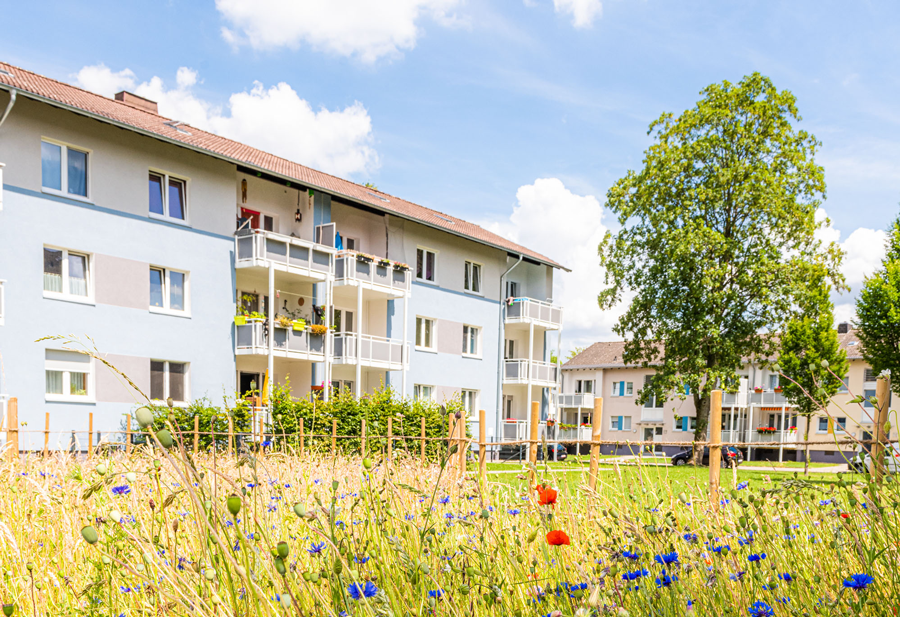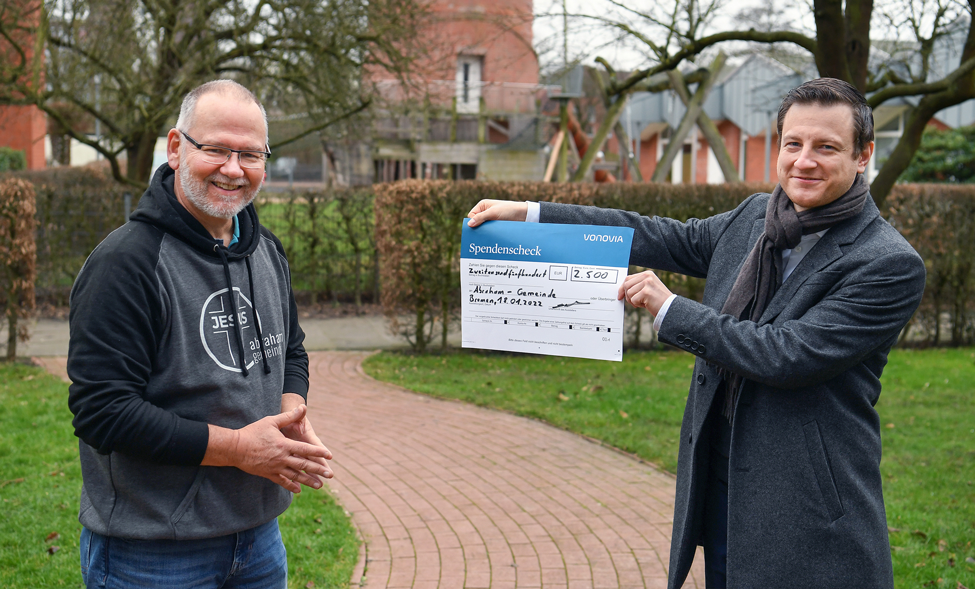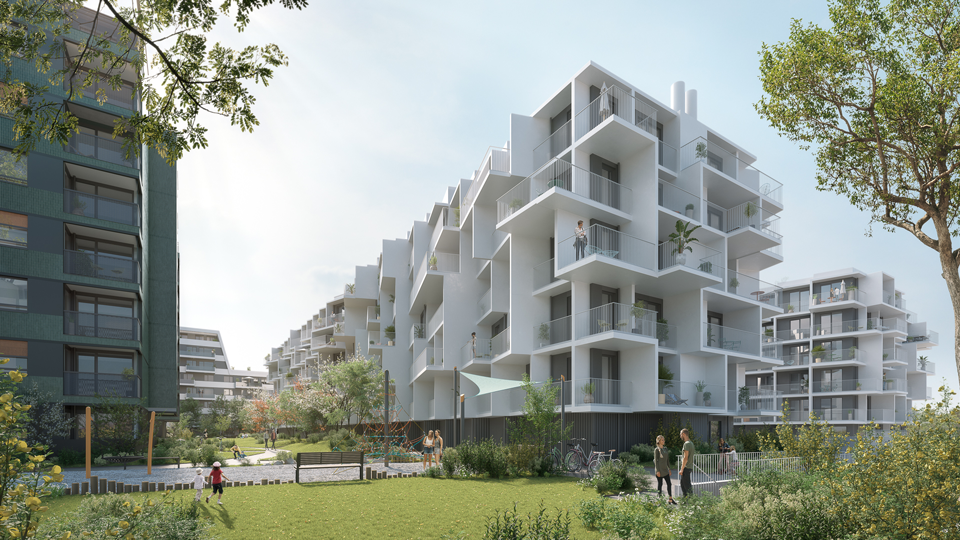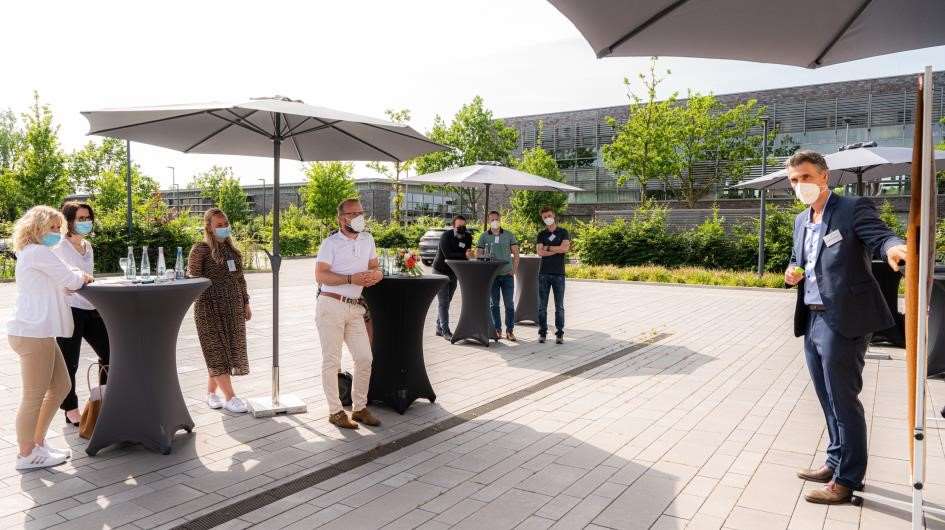Community Development and Contribution to Infrastructure
GRI
103-1
103-2
103-3
203-1
Our Approach
Vonovia offers people a home in its neighborhoods. The company’s aim is for them to be able to find a good neighborhood in which they feel comfortable and which brings different generations together. We are convinced that a livable neighborhood strengthens tenant loyalty and increases the value of residential properties.
As a result, thinking and acting in terms of neighborhoods is our main approach to finding solutions which will drive the economic, environmental and social development of our urban housing portfolios. With this in mind, Vonovia takes a holistic perspective on neighborhoods and develops infrastructure that is tailored to suit the individual challenges of each neighborhood, that is geared toward the needs of the tenants and that combines structural design, climate protection and services to meet social needs.
We analyzed and restructured our portfolio structure in 2021 in order to increase our focus on the neighborhood approach. Around 70% of Vonovia’s portfolio is located in neighborhood settings – equivalent to 586 urban quarters, each containing 430 residential units on average. In this context, we understand an urban quarter – as per the definition of the German Housing and Real Estate Companies (GdW) – as a visually coherent urban development structure that is seen by its residents as a distinct area and that represents an area for action in which the residential real estate company can make a difference and see positive effects. It comprises at least 150 apartments. In addition to the urban quarters, there are unique strategic properties (urban clusters) to which the options for action of the strategy and business model are adaptively applied (see The Company).
In our view, the development of these interconnected portfolios offers a great deal of potential for shaping construction and society and contributing to sustainable community development. Vonovia neighborhoods are always aligned with clear climate protection requirements (see Reducing CO2 in the Real Estate Portfolio/Energy-efficient Modernization) and social compatibility (see Fairly Priced Housing). This adds joined-up approaches and new technology-based options to the range of measures that we have available to shape our portfolio while creating places that are fit for the future from both a social and environmental perspective. Synergy effects truly release their potential within the neighborhood approach.
Derived from this, we develop a coordinated neighborhood-specific infrastructure that combines structural design, climate protection and social offerings. Our climate protection goals will only be within reach when we take a systematic neighborhood approach. It is particularly important that we take a holistic approach in this area so that we can ensure that our neighborhoods are developed in line with our climate plan and aligned with climate protection requirements. Strategies that bring together power, heat and mobility in our neighborhoods have a decisive role to play in ensuring the success of our energy transition (see Reducing CO2 in the Real Estate Portfolio/Energy-efficient Modernization). This kind of strategy opens up entirely new ways to expand our range of services and trial new technologies like sector coupling (see Renewable Energies and Energy Mix). We are creating new living space in conurbations through densification and adding extra stories (see Sustainable Construction and Refurbishment).
We also take responsibility for designing our neighborhoods. We are expanding the infrastructure to meet local needs. To achieve this, we are creating space for local suppliers, medical services or educational institutions, social facilities and services, and creative artists (see Inclusion, Diversity and Social Cohesion). Modern mobility options such as the creation of a charging infrastructure for e-mobility (see Renewable Energies and Energy Mix), car sharing options, or the expansion of parking spaces for bicycles are also important parts of community development that must be considered from the outset. Vonovia also designs residential environments, playgrounds and green spaces in such a way that they strengthen participation and urban coexistence, enhance the quality of living and are also sustainable from an ecological perspective (see Biodiversity).
As a matter of principle, we want to implement community development projects in such a way that the acceptance of construction measures and other projects increases. We therefore actively involve our tenants in the associated intensive coordination processes (see Involvement and Participation). We also cooperate with authorities and other municipal and social institutions and exchange ideas with political representatives. Through discussions with the stakeholders involved, we gather experience and incorporate it into our concepts. Only if they are supported by everyone can we implement them successfully and promote value creation.
Organizational Focus
Community development projects are planned and managed on a decentralized basis via the regions. The regional managers for the West, North, East and South regions are responsible for the respective projects and implement them along with their regional managers.
The Chief Rental Officer (CRO) is the Management Board member responsible for the property management business in the North, East, South and West business areas, as well as for customer service and portfolio and tenant management. We are increasingly using our own neighborhood developers for on-site implementation. This allows us to address any specific issues as and when they arise.
The regions are also responsible for managing the investment and participation formats, as well as corporate citizenship and philanthropy. This approach is supplemented, also from a quality assurance perspective, by centrally managed supporting measures via corporate communications.
Objectives and Measures
Our goal is to create housing that meets people’s needs and is worth living in. To this end, we carry out community development projects in cooperation with cities and municipalities and initiate further projects every year with the aim of improving the infrastructure, realizing integrated energy concepts and dealing with urban development issues.
In concrete terms, this means, depending on demand:
- Creating affordable homes by means of vertical expansion, densification and new construction
- Implementing modernization in a socially responsible manner
- Optimizing the energy requirements of our portfolio
- Thinking about and designing the residential environment in an integrated way, including recreational areas, playgrounds, and holistic mobility concepts
- Local suppliers, daycare centers, doctors and social and cultural institutions
- Promoting dialogue with tenants and stakeholders in order to encourage acceptance and influence
In 2021, there were 15 community development projects in the operational implementation stage across Germany comprising approx. 8,600 residential units as part of the community development investment program. These include various key components such as energy-efficiency refurbishments, constructing new homes, and measures to design an appealing residential environment. These are supported by additional social services, aspects pertaining to urban development and necessary infrastructure measures. These projects generally run for a period spanning several years. In 2021 Vonovia invested € 61.6 million into 15 community development projects. As part of the further development of our investment strategy, some 20 neighborhoods in 2022 will be analyzed in terms of their environmental performance and social megatrends before being extensively prepared.
Environmental and social aspects go hand in hand within our neighborhood approach. Vonovia is equally committed to both aspects and to promoting social interaction in the local community. Measures to strengthen shared living only become manageable and effective through the neighborhood approach. This is a process involving city and municipal authorities as well as our tenants in order to jointly develop solutions for the neighborhood. It uses various instruments and cooperation initiatives to achieve this, e.g., by making premises available, establishing services, neighborhood meet-ups and daycare centers hand-in-hand with cooperation partners that focus on the greater good (see project box “Integration and Coworking in Bremen Commercial Units”).
In Austria, we set up community development schemes where necessary, which will support every new neighborhood until its structures have been fully established. We also support social and technical infrastructure through financial contributions.
Another aspect of community development projects is the promotion of modern mobility concepts such as e-mobility. For example, e-charging stations give our customers the opportunity to switch to an electric car, and car sharing options allow them to do without their own car altogether. This not only has a positive impact on the climate, but also reduces costs for our customers and strengthens their relationship with Vonovia, while also increasing land values in our neighborhoods by reducing the amount of land devoted to parking. In terms of e-mobility, this comprised the measures for 2021 detailed below – which will be gradually rolled out in our neighborhoods over the next few years:
- Reducing car parking spaces and installing bicycle parking spaces and bicycle garages for e-bikes
- Expanding car and bike sharing services (including for e-vehicles)
- Providing connections to public transportation
- Promoting electromobility, e.g., by installing charging stations for cars and e-bikes
According to our internal specifications, charging stations must always be pre-installed when modernizing existing buildings or constructing new buildings. Around 30% of our new construction projects completed in 2021 already feature charging stations. On average, each newly built apartment currently has 1.7 parking spaces for bicycles, and the closest public transport connection can be reached on foot in less than four minutes.
The residential environment plays a particularly key role in the community development measures implemented by Vonovia. New green spaces and playgrounds, as well as socially designed community centers outside the buildings can create real added value for tenants. Particularly in urban environments, the issue of spaces for relaxation is becoming an increasingly important factor in terms of how people assess quality of life (see project box “Kennedy Garden: Shell of ‘Lavandula’ & ‘Orchidea’ Completed”). We make a positive contribution to social development through projects such as establishing community gardens. In 2021, we were able to establish wildflower meadows and insect habitats in numerous locations (see Biodiversity).
Community development calls for complex teamwork and extensive knowledge of all employees to ensure successful implementation on location. From an organizational standpoint, the challenge of the neighborhood approach lies in reflecting networked thought and action within the organizational structure, facilitating knowledge transfer and establishing the processes necessary for this to happen. Here, Vonovia follows the approach of providing central support services for local decision-makers and actors and ensuring the transfer of best practice.
Thanks to the Neighborhood Academy, an internal training and networking format launched in 2021 as acapacity building project, employees can be qualified as community development experts. This certification program provides a solid foundation for an active and innovative culture of learning and development at Vonovia which will ensure the success of our community development projects. Over the twelve-month program, internal and external experts in the economy and research topics will run virtual live sessions and workshops on a variety of subjects. Participants will also be able to learn on their own time to get a well-rounded understanding of community development. The Neighborhood Academy not only teaches innovative knowledge, but also focuses on the training of specific skills. At the same time, it enables the systematic sharing of experiences among participants. The program was designed by the Human Resources department in partnership with the European Training Center for the Housing and Real Estate Industry (EBZ) in Bochum. Participants have provided extremely positive feedback about the program (see project box “Vonovia Neighborhood Academy: Ourt Innovative Expert Program“). The Neighborhood Academy is looking forward to its second intake in mid-2022.
In recent years, Vonovia has acquired a significant amount of experience in running large community development projects. It has employees with an extensive amount of expertise around the country. Specifically for the topic of community development, and in addition to the Neighborhood Academy, we developed a knowledge platform – the Vonovia Neighborhood Guide – in the year under review to assist with knowledge transfer and networking within the organization. The platform provides articles and guides from internal experts so that all Vonovia employees can benefit from the company’s previous experience. The topics covered range from societal megatrends through to building solutions and pointers for handling social projects. The platform already covers over 50 topics. We add and update information on a regular basis.
In order to further spearhead research in the field of community development and living, Vonovia sponsors a foundation professorship – held by Prof. Dr. Jan Üblacker – at the EBZ Business School University of Applied Sciences in Bochum, thereby firmly embedding the neighborhood perspective in the education of EBZ students.





